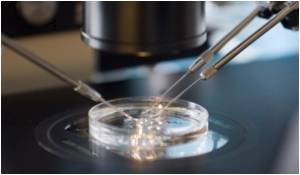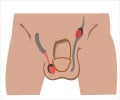US regulators are investigating a California man who donates his sperm for free to couples who want to have a baby.

A cease-and-desist letter from the FDA in November 2010 did not dissuade him -- there have been five pregnancies and one birth since that notice arrived, he told AFP, adding that he still has no hearing date with the regulatory agency.
"I want to continue because the amount of e-mails from childless couples has been tremendous," Arsenault said. "All of them have similar stories -- that it is too costly to conceive via a sperm bank."
People who purchase from a registered sperm bank typically pay between $200 and $675 per dose, according to Fairfax Cryobank in Virginia.
Arsenault's personal website, trentdonor.org, describes him as a blond-haired, brown-eyed Silicon Valley tech worker.
His background is half German, one quarter Irish and one quarter French. He learned to play piano by ear by the age of eight, speaks Spanish and English, is "amazed by nature" and studied engineering at the US Naval Academy in Annapolis, Maryland.
He donates his sperm at no cost to "married couples with fertility challenges and female domestic partners," according to his site which links to a donor agreement that absolves him of responsibility and visitation rights.
His recipients are not named but numerous pictures of babies are posted along with anonymous testimonials such as "advanced for her age," "healthy... strong," and "everything I could ever ask for in life."
The FDA declined to comment because the matter involves an open investigation.
However the agency said in an email to AFP that sperm donations must be screened for a host of sexually-transmitted diseases, including HIV, hepatitis and gonorrhea.
"Under FDA's regulations, sperm donors are required to be screened for risk factors that may increase the chances of transmitting a communicable disease," it said. "FDA regulations apply to tissue intended for transplantation only."
Arsenault has posted online copies of lab results showing he tested negative for HIV, chlamydia, gonorrhea, hepatitis A, B and C, and herpes.
However his sperm samples are labeled: "For immediate transfer to SIP (sexually intimate partner)," "Not evaluated for infectious substances," and "Warning: advise recipient of communicable disease risks," his website says.
Arsenault has appealed the FDA's order on the basis that "he could provide documentation by and testimony from women to whom he had donated.... that he was a sexually intimate partner," according to legal documents.
In that case, he should be considered "exempt from the regulatory requirements," his lawyer argued in the documents. Arsenault said he is currently awaiting a response from the FDA.
According to Trina Leonard, a spokeswoman for Fairfax Cryobank in Virginia, people who use his services may be saving a few hundred dollars but are risking a lot.
"There is so much testing and protection involved with donor sperm from a reputable bank that is not in place for people who are using this renegade sperm donor," she told AFP.
"This is like conceiving a baby with somebody you just met, or unprotected sex on a first date with. It is completely unprotected, unscreened, un-anything-ed. That is just crazy," she added.
Only one to two percent of all would-be sperm donors are accepted by official sperm banks, and donors tend to be paid $100 to $150 per donation, Leonard said.
As to what motivates Arsenault, his website contains 10 bullet point descriptions including his "spirit of volunteering to the community," his respect for women, his faith in God, and his rejection of powerful corporations that profit from commercial sperm banks.
"One of Trent's closest childhood friends was an only child whose parents tried for years to conceive," it adds.
"Trent knows first-hand the struggle families go through to have a child and he wishes to help."
Source-AFP










